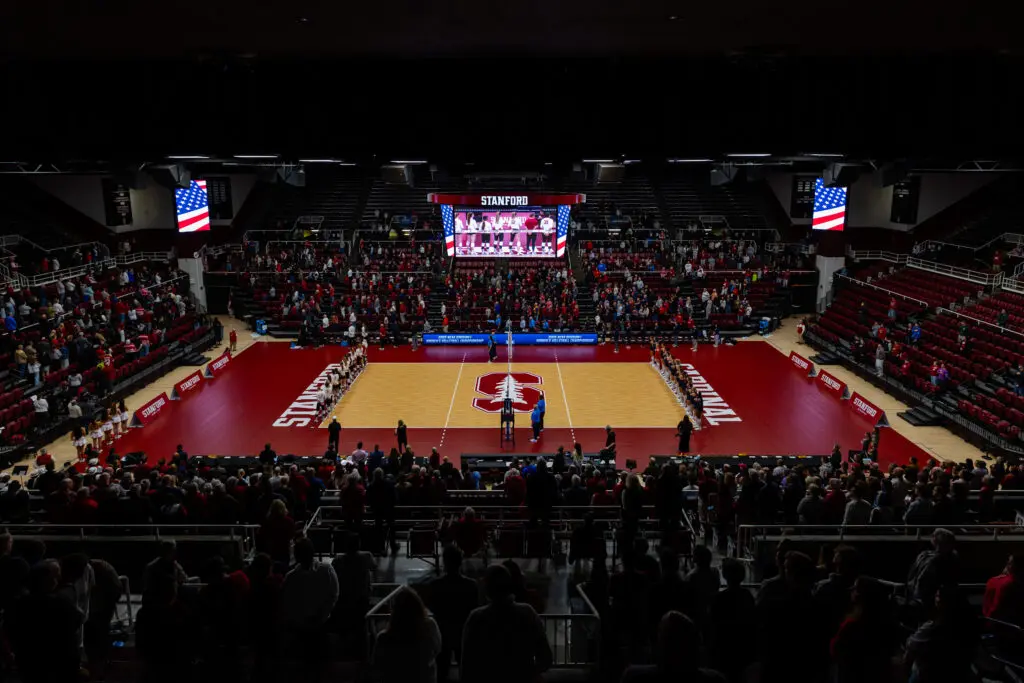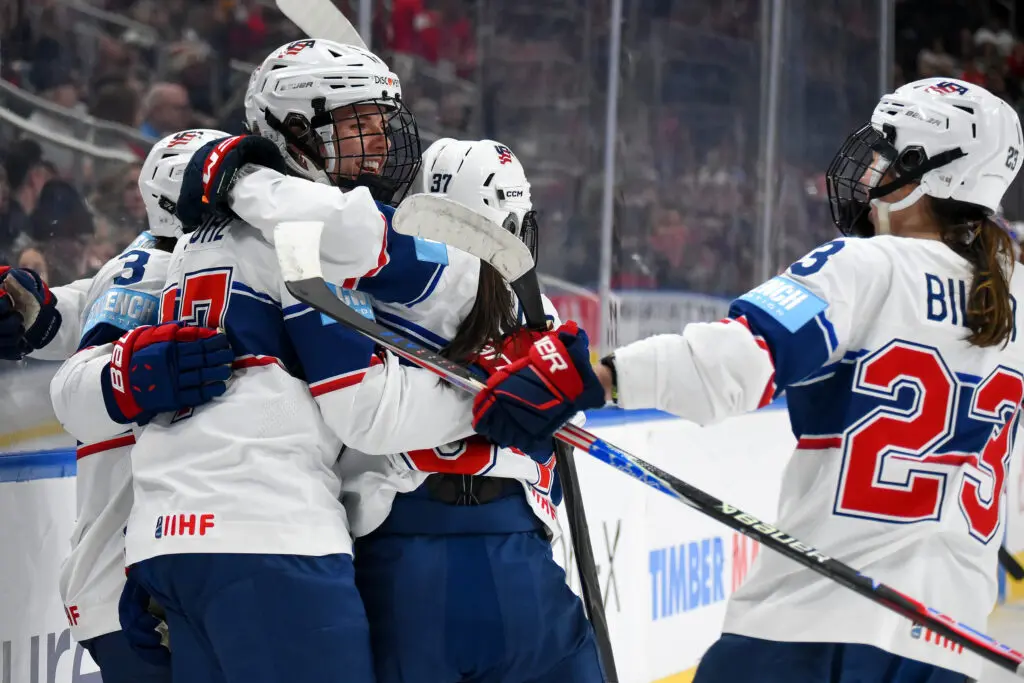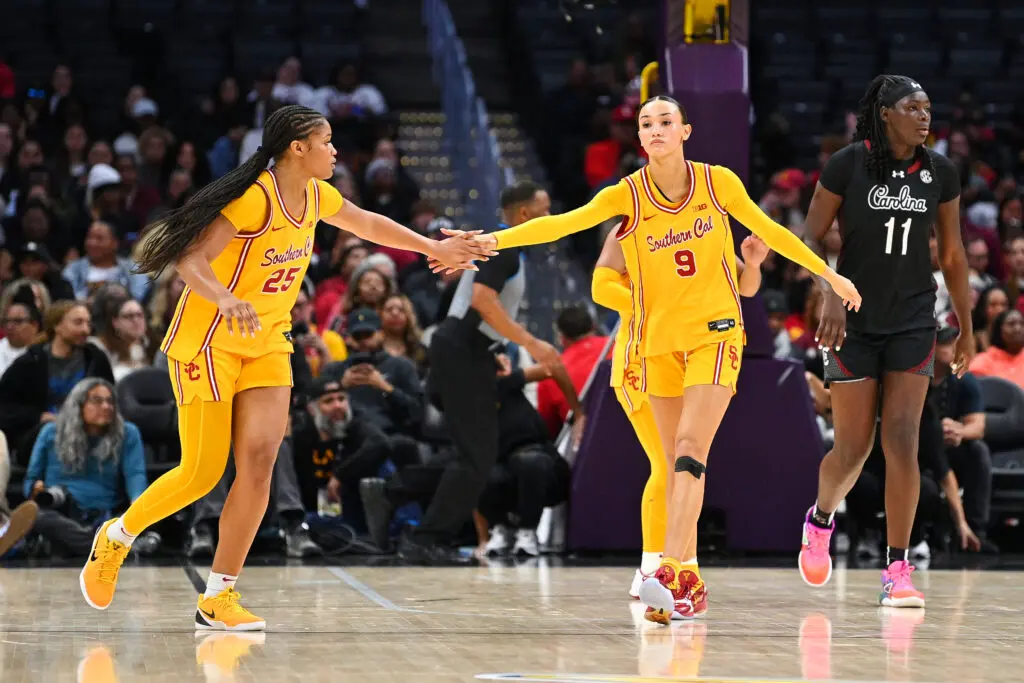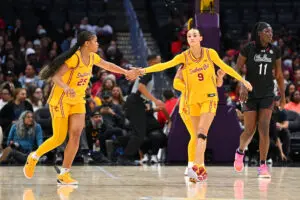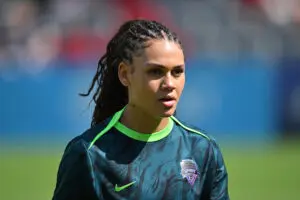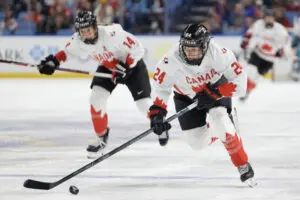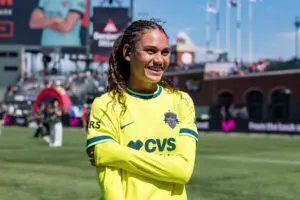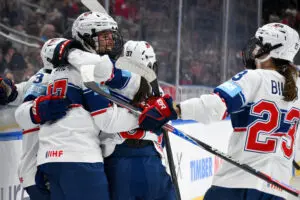The year-round, globetrotting life of WNBA players was thrust into the spotlight in recent months after star center Brittney Griner was arrested at a Russian airport in February just before the country’s invasion of Ukraine. While the overwhelming concern continues to be getting her home safely and swiftly, her case re-enflamed the debate about why so many WNBA players go overseas during the league’s long offseason.
Is it because they love to hoop and want to work on their game and travel the world? Or is it all about the money? Are they victims of gender-based pay inequality in the U.S., forced into a financial choice that jeopardizes their safety and well-being?
As in all things, it depends on whom you ask.
In her pre-draft press conference earlier this month, WNBA Commissioner Cathy Engelbert told reporters, “I think one of the narratives — that the players have to go overseas — is a little bit outdated actually, I think, and inaccurate.” After describing league efforts to enhance domestic financial opportunities for players in the offseason she said, “We’ve been paying players this year to do marketing outside of them having to go overseas, but players are still going to want to play basketball. One thing I learned, and I didn’t know this before I came into the league, they want to play basketball year-round.”
WNBA Players Association President Nneka Ogwumike had a different perspective. The morning after the draft, the Los Angeles Sparks forward appeared on “Good Morning America” to discuss Griner’s status.
“The reality is she’s over there because of a gender issue, pay inequity,” she told Robin Roberts. “We go over there to supplement our incomes and, quite frankly, to maintain our game. Our teams encourage us to keep up with our game by going over there and being more competitive … We don’t want to play 12 months out of the year. We don’t want to feel as though we have to go over there to get what we want to get at home.”
To shed more light on the players’ perspective, Just Women’s Sports spoke with three current WNBA players about their overseas basketball life: the good, the bad and the surprising.
Ariel Atkins, entering her fifth year in the league with the Washington Mystics, spoke to us on the eve of her final game with her Ukrainian team, whose lives had just been completely upended by the Russian invasion. Brionna Jones, a six-year veteran and the WNBA’s 2021 Most Improved Player, was in the midst of an MVP-caliber run in Europe’s most competitive league when we caught up with her long distance from the Czech Republic. And Erica McCall, also entering her sixth year in the league, chatted with us from Istanbul, where she was wrapping up her annual stint abroad before heading back to the states to rejoin Atkins in D.C. (McCall was later waived from the Mystics’ final roster.)
Each WNBA player’s experience abroad is unique, but the common themes that surfaced in the conversations with these three players are revelatory for how we think about the game both at home and abroad. And though we often hear from the biggest names in the league about key issues, it’s arguably the other 90 percent of players whose livelihoods are the most dependent on overseas income.

1. The hardships are … hard
The toughest challenges for those who play overseas are inadequate time with family and physical strain on the body, all three players shared.
“I don’t see my family a lot, miss a lot of holidays and birthdays and all that good stuff,” McCall said. “And so, it’s always gonna be hard. Especially these past few years, I’ve missed Christmas, and Christmas is such a huge part of my family tradition.”
For those who play for European teams, which often offer the highest salaries, there is virtually no gap between the end of their WNBA seasons and the start of their overseas commitments. It’s the same on the backend, with overseas seasons typically running into the early weeks of the WNBA. The windows of time for them to return home and visit with their families are few and far between. Opportunities to rest and rehab their bodies are equally scarce. Jones said the quality of the physio support has started to become a bigger factor in signing international contracts.
“The treatment and stuff that we get at home in the States is a lot better than what we have available here,” she said. “Not having that time to recover between seasons, you need that treatment to get you through.”
Atkins said she tries to be smarter about taking physical risks on the court overseas.
“There are some plays where you just gotta make a career decision. Like, do I really need that steal? Do I really need this stop?” she said. “When it’s time to put my body on the line, I’m willing and able to do it because I didn’t waste it early on just trying to get a random loose ball that’s probably gonna go out of bounds anyway.”
2. Players aren’t asking for much
A surprising commonality for all three players was what it would require to make the year-round grind of their profession much easier. The answer? Not a lot.
“I need a month somewhere,” Jones said when asked what her ideal schedule would be. “A whole month together, either before I go back to the W or after the W’s over. Just like a month off to rest and recover.”
It was the same answer for McCall. “I would love for the overseas season to be one month shorter so that we can all go home, recuperate, let our bodies rest,” she said. “A month would be amazing for me. And be able to get our bodies ready for the WNBA season.”
For Atkins too, a month between is all she wants. “That sounds like a lot of time, but it not only gives me time to rest and see my family, it also gives me time to focus on one or two things that I want to add to my game. And it lets me breathe,” she said.
3. There are some serious upsides
The WNBA is one of the most competitive sports leagues in the U.S. in terms of the number of roster spots available, and the depth of talent vying for them. The three-month regular season creates a pressure-cooker environment where playing time is scarce and expectations are high.
When that top-level talent spreads out around the globe during the offseason, players can expand their roles a bit more.
“I would say that I definitely do some things here, and I have a lot more freedom with my coaches here than I would back in Connecticut,” Jones said. “We have so much talent there, so I do what I do well in Connecticut to bring that to the team. But over here, I get to do a little bit more.”
All three players talked about how they play more freely overseas and are able to develop their in-game skill sets.
“Just not thinking so much,” Atkins said. “I think that’s my biggest thing that I’m allowed to do overseas is that I build up that muscle of not overthinking things in the game and just allow myself to flow and trust the work that we’ve put in.”
The overseas season can also be a crucial counterbalance for young players struggling to secure their footing in the WNBA.
“I always loved overseas because even though when I was in Indiana, I wasn’t playing a lot, I always had overseas to fall back on to display my skill set, to remind myself how great of a player I was,” McCall said. “Honestly, I was losing my confidence in my first three years of the league, and I loved overseas because I could come back and really show the basketball player that I was.”
Their abroad seasons also give them the chance to become more vocal leaders. Because the WNBA is viewed as the most elite women’s professional basketball league in the world, their overseas coaches and teammates expect them to be leaders right away.
“I think me playing for this team this year has really helped me with that. It has forced me to kind of step out of my comfort zone,” Atkins said. “I feel like a lot of times, I get nervous about speaking up, but I don’t really get that choice here.”
“Having a chance to be more vocal with your team, it’s a pretty cool opportunity to have,” McCall said. “That’s helped me a lot, going back to the WNBA, just allowing myself to be more comfortable, be more vocal with my teammates, not being afraid to push them to be better.”
These inconspicuous upsides demonstrate that, even if WNBA salaries eventually become high enough to nullify overseas contracts, there are valuable on-court benefits to having some type of offseason developmental league. And, of course, if the WNBA schedule, number of franchises and roster sizes expand significantly in tandem with salaries, there would be more space for in-house player development.
4. It’s not just the salaries that are better overseas
Crazy, diehard, intense — that’s how the players described the game atmosphere abroad. Women’s basketball fans overseas (at least in Europe) have a consistent track record of being loud, invested and loyal supporters of their teams. The EuroLeague semifinal game between Istanbul’s Fenerbahce and Hungary’s Sopron Basket last month provided a clear image of this reality. With constant crowd-wide chants, organized cheers, referee heckling and raucous celebrations, the arena overseas more closely resembled international soccer stadiums than American basketball sporting events.
Greatest atmosphere in #EuroLeagueWomen history. 𝗣𝗘𝗥𝗜𝗢𝗗.
— EuroLeague Women (@EuroLeagueWomen) April 8, 2022
THE ROOF IS GOING OFF THE BUILDING IN ISTANBUL! 👏😱 pic.twitter.com/8ZKHc8ka8y
“It was really cool that women’s sports were so well respected and that everyone wanted to come out and see the women’s basketball team playing,” McCall said. “You don’t get that in the States. You don’t get that type of respect that we had or receive. And that’s something that I really enjoy about overseas basketball — the love for the game is just at a different level.”
“The fans can get quite rowdy,” Jones said. “I’ve played in France and Spain, and those are some of the best fans … I definitely think they do a really good job of promoting the women’s side over here.”
While there are marketing lessons to glean from the overseas leagues, the players believe it’s more about geographical identity than anything else.
“I think they’re diehard for their city and where they’re from. Whoever puts that flag on, they’re like, ‘This is my team,’” Atkins said. “In the States, you have options. You can be a Lakers fan, but you can be from Philly. That’s probably not gonna fly overseas.”
McCall described the fans of her Turkish Besitkas team much the same. “When you’re born, you choose the team, and this is your team for your life and this is the life that you live. You live a Besiktas fan life,” she said. “It’s very intense, win or lose … Live and die, this is what they love. It can be intense.”
For the fans these players have come to know, it’s not about whether you’re a fan of women’s basketball, but whether you support your city or your country, regardless of sport and gender. While that nationalistic fervor can’t necessarily be duplicated in the U.S., the lesson for WNBA teams may be to continue efforts to tap into the city loyalty and identity of their fan bases. The new coalition formed among women’s pro sports teams in D.C. will be an interesting test case along these lines.
5. Prioritization is going to be a problem
Even before Griner’s arrest, the issue of overseas contracts for WNBA players was approaching a tipping point. Widely praised for its salary increases and improved benefits for players, the WNBA’s groundbreaking CBA also included a new “WNBA Prioritization” clause that largely averted the limelight when the deal was ratified in early 2020.
This new rule dictates that, starting with the 2023 season, fines and suspensions will be implemented for veteran-level players who do not report to their WNBA teams by certain prescribed dates (e.g., the start of training camp).
Most European basketball leagues, where the majority of players go in the offseason, run past the start date of the WNBA season, causing a significant number of players to show up late to their U.S. teams. The delayed arrivals of so many key players is a serious detriment to on-court cohesion and the league’s ability to maximize its product for the compact three-month regular season. But most players earn more money from their overseas contracts, often by a large margin, making it very unlikely they’ll simply opt out or break the terms of those lucrative deals.
The players we spoke with, however, don’t blame league officials for the dilemma they will soon be facing.
“I know the league is in a tough position because they want their athletes here,” McCall said. “It makes it really challenging. I understand where the league is coming from, but at the end of the day, for players like myself, it just makes it hard for us to be able to make a good living and also live out our dreams.”
“I understand what the WNBA was going for and trying to get players to prioritize playing in America,” Jones said. “But I’m getting paid more to play overseas and I can give up these three months [of the WNBA season] and make a lot more money playing overseas and save my body.”
When asked whether she would consider sitting out the WNBA season completely, Jones admitted, “I would consider it for sure, if it came to that.”

Even though players admit the intentions of the prioritization clause were noble, no one wants the players to bear the brunt of the consequences of a global sporting system with a scheduling conflict. The negative consequences of the rule are looming: It wouldn’t be surprising to see well-known players opt out of the WNBA altogether, or the league be criticized for handicapping their players’ earning ability. But Engelbert and her colleagues are hoping for patience from players and constituents while they continue to grow the at-home earning potential of their athletes.
One major domino in this effort will fall in 2024, when the WNBA’s grossly undervalued broadcast deal with ESPN expires, leaving many hopeful that new revenue streams for salary boosts are on the not-so-distant horizon.
With Griner detained in Russia instead of in the jump circle for the Phoenix Mercury’s tipoff against the Las Vegas Aces this Friday, and the prioritization clause looming, the global nature of women’s pro basketball is headed for major upheaval.
One way to reach pragmatic solutions for the hurdles ahead is to have open conversations about the challenges at stake. McCall herself is working to get more players’ stories told with her “Bird’s Eye View” podcast, where she chats with fellow WNBA players about their experiences overseas. As a seasoned vet looking back, she has well-earned advice for young players going abroad for the first time.
“Overseas is all about what you make it, and that’s what I really try to explain in my podcast — it’s all about a mindset,” she said. “It makes you a better player. It makes you a better person and ultimately helps grow your game. And you’ve got stories to tell. You’ve always got a story to tell.”
Tessa Nichols is a contributing writer at Just Women’s Sports.

